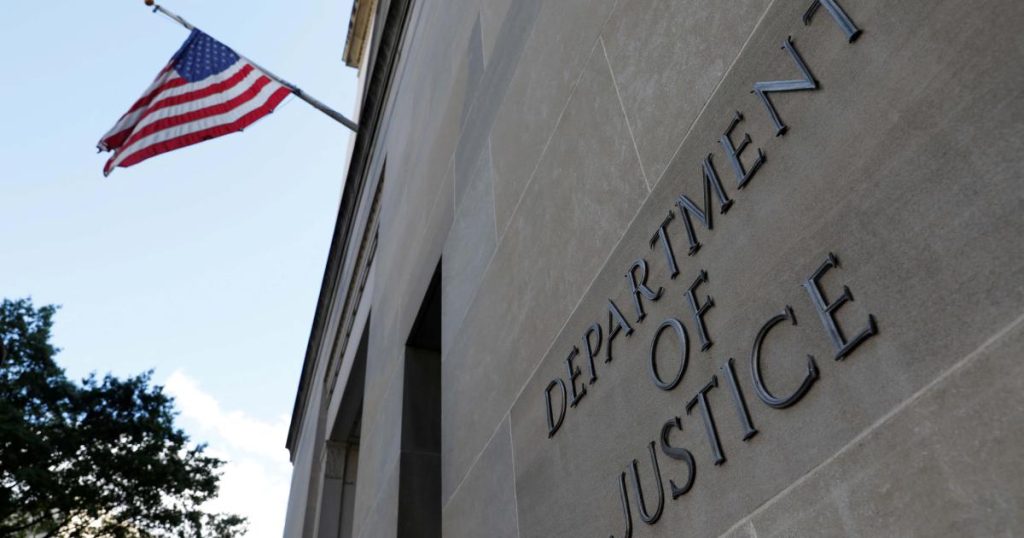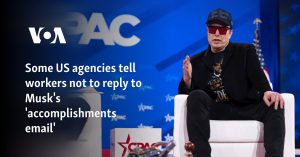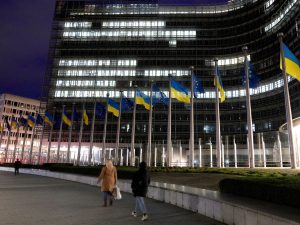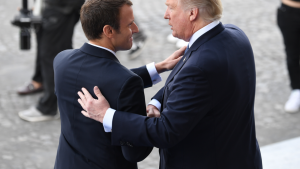
Some years ago, while serving as the U.S. State Department’s first coordinator on global anticorruption, I visited a country in West Africa as part of my fieldwork. During my visit, an American businessman whose company was operating an important national enterprise told me about a government official who had solicited a bribe from him. When I asked how he got out of the situation, he said it was simple: “I told him that I wasn’t going to go to jail for him.”
The law this businessman was not willing to break was the Foreign Corrupt Practices Act of 1977. U.S. President Donald Trump issued an executive order on February 10 that paused its enforcement, flying in the face of nearly 50 years of U.S. policy and practice. Trump alleges that FCPA rules are shutting U.S. companies out of lucrative business opportunities. But the evidence for this claim is weak and scant. In reality, a lighter approach to investigating and prosecuting foreign bribery by U.S. firms will ultimately hurt American businesses and taxpayers.
American lawmakers developed the FCPA in response to a series of bribery scandals in the 1970s that had embarrassed the United States, undermined its foreign policies and international partnerships, and injured its companies. Dozens of examples exist, but a lowlight involved the bribery of Japanese Prime Minister Kakuei Tanaka by Lockheed, a U.S. defense contractor. Congressional debates were detailed, specific, and wide-ranging, involving expert testimony and careful consideration of a variety of issues, including the implications for U.S. economic competitiveness and how an extraterritorial application of U.S. law might be perceived abroad. The final version of the FCPA was passed by unanimous consent in the Senate and a vote of 349–0 in the House, demonstrating a prevailing national consensus that foreign corrupt practices were inimical to U.S. interests.
Since then, the FCPA has become a bedrock of U.S. international economic policy, an inspiration to other countries, and the source of the Organization for Economic Cooperation and Development’s 1998 antibribery convention. It is also a cornerstone of U.S. foreign policy and is widely regarded, both by American businesses and their partners overseas, as what separates U.S. economic actors from those in China and Russia.
In the name of preserving U.S. economic competitiveness and his own foreign policy prerogatives, Trump has in effect asserted that only through corrupt practices can the United States compete and succeed. His order does not only denigrate U.S. firms that have managed to conduct their business for decades without corruption. Trump is also exposing all U.S. international business to the demand of bribes and favors to obtain contracts, undermining the United States’ advantages both in practice and in reputation.
INCHING TOWARD IGNOMINY
Under the FCPA, it is illegal for “certain classes of persons and entities tomake payments to foreign government officials to assist in obtaining or retaining business.” These persons and entities include U.S. citizens and resident companies; after a 1998 amendment, they included foreign individuals and entities whose activities within the United States were also covered by the FCPA. Since its inception, the FCPA has obligated foreign companies listed in the United States to meet certain accounting requirements, such as maintaining accurate books and internal controls over transactions.
Such requirements have allowed the United States to prosecute cases resulting in billions of dollars in fines. Some of those took place during the first Trump administration. Far from penalizing U.S. firms unduly, over 40 percent of U.S. prosecutions have had foreign defendants, and foreign actors who abused the U.S. financial system to commit their crimes are amply represented on the list of the highest fines issued under the law. FCPA prosecutions have involved companies operating around the world, including some that undermined U.S. political and economic interests through corruption. Many foreign governments have greeted these prosecutions positively, not least because they have resulted in restitution paid by criminal operators and once-lost funds repatriated to victimized populations.
Still, the primary beneficiaries of the FCPA have been U.S. firms (and their shareholders) that wish to operate abroad without paying bribes. To be sure, some U.S. firms have used bribery to obtain concessions and contracts. The same history that members of Congress cited in their decision to negotiate and adopt the FCPA includes the names of dozens of U.S. companies that bribed their way into valuable concessions, procurement contracts, and deals. But paying bribes is a tricky business. For every business deal consummated thanks to a bribe, there are also examples of politicians being arrested and deals falling apart because of bribery. Bribery, after all, is a crime—Article 15 of the UN Convention Against Corruption obligates all signatory governments to make it so. Businesses that pay bribes are contributing to a crime and as a result can face legal consequences in any country where they operate.
Moreover, with the FCPA in place, eschewing bribery is not the competitive disadvantage that it might otherwise be. U.S. companies can say with clarity and resolve that they may not engage in bribery lest they be prosecuted by the U.S. government, which has a long record of successful prosecutions. Anyone who has ever engaged in a negotiation knows that one of the most valuable tools is to “blame the third party”—and the U.S. Department of Justice has, until now, been an ideal party to blame. And the Foreign Extortion Prevention Act, which was passed by a bipartisan majority in 2023, has helped neutralize any lingering competitive disadvantages that might exist for U.S. companies complying with the FCPA by making the solicitation of bribes by foreign officials prosecutable as well.
Congress can push back on Trump for weakening the Foreign Corrupt Practices Act.
International businesses that have complied with U.S. legislation have become leaders in encouraging government action on corruption and pushing back on corrupt practices themselves. When I was the chair of the Anti-Corruption Leaders Hub for Galvanizing the Private Sector, an initiative of the Organization for Economic Cooperation and Development, I met with dozens of companies that were committed to fighting corruption and bribery because they thought it was in their financial interest. Members of the hub include some of the world’s leading companies, such as Amazon, General Motors, Siemens, and Tesla. They support projects such as the Blue Dot Network—an initiative created by Australia, Japan, and the United States in 2019, when Trump was in office, and now under the aegis of the OECD—which verifies the sources of financing for foreign infrastructure projects, as well as their adherence to safety rules and other compliance measures. For major firms, the loss of the FCPA will be damaging because it will become easier for unqualified firms that are willing to pay bribes to earn business that is undeserved. And companies that use corruption to get undeserved business typically perform poorly, providing deficient products, infrastructure, and services that harm consumers. The horrific collapse of housing projects in southern Turkey during the 2023 earthquakes is a case in point.
Undoubtedly, some businesses will celebrate Trump’s decision. After all, FCPA compliance imposes costs on firms, many of which have no intention to pay bribes, and even the notional risk of litigation is a burden for companies operating internationally. This is understandable; no one wants to be prosecuted or labor under the specter of prosecution. Yet companies now face a new problem: being actively solicited for bribes but unable to give the automatic “no” that FCPA compliance rules make easy. Many U.S. companies will have to come up with the money to pay those bribes to make and sustain deals. This burden will weigh on clean and corrupt companies alike.
Every foreign contract that U.S. companies get will now be tainted by questions of bribery. Even if untrue, the mere allegation will expose those companies to further solicitation, as there is rarely a deal in which only a single bribe is requested or required. This association will follow them everywhere they do business. After all, since they must have bribed someone to get their contract or concession in one country, why shouldn’t they offer the same in another?
Trump is risking the standing of the United States in the international anti-money-laundering monitoring system administered by the Financial Action Task Force, an intergovernmental body that coordinates standards for banking practices. Bribery and corruption are forms of money laundering, and as a member of the task force, the United States will be expected to demonstrate its compliance with its standards when the country’s Mutual Evaluation, a required process of scrutiny conducted by fellow members, begins in 2026. Even discussion of whether the United States ought to land on the task force’s “gray list”—effectively a probationary status—for having less than satisfactory standards can be costly to U.S. companies and banks. Institutions and companies that operate from countries on this list find their transactions subject to more intense scrutiny and can have difficulty acquiring financing. How members will apply such scrutiny to a financial sector as large and systemically important as that of the United States is far from clear, but that only serves to highlight just how extraordinary Trump’s moves are.
CEDING GROUND TO CHINA
Another problem with Trump’s executive order is the long-term fragility and risk it will introduce to U.S. trade relations. Corruption is not popular, and neither are those who engage in it. If and when U.S. firms are found to have engaged in corruption in advance of their business deals, the exposure will harm the United States, as happened before the FCPA was established: foreign governments that had been partners of the United States were brought down by corruption scandals, their venality enabled by the bribes of U.S. companies. When those corrupt governments fell, the United States lost more than business deals. It also lost the access and influence it once had. Avoiding such self-inflicted harm was one of the reasons for creating the FCPA in the first place. Opening the door to corruption once again, on top of the Trump administration’s evisceration of foreign aid programs, augurs a deterioration in Washington’s ability to influence political, economic, and security developments in regions that will be crucial for the United States’ future, not least in Africa, Southeast Asia, and the Western Hemisphere.
From a geostrategic perspective, Trump’s abandonment of the FCPA is a disastrous decision. It is true that foreign governments do not take the same zealous approach to FCPA implementation (or their national equivalents) as the United States has in the past. But unlike the United States today, they still pay lip service to the idea that they are faithfully and fully implementing their obligations under the 2005 UN Convention Against Corruption and the OECD’s 1999 Anti-Bribery Convention.
China will be especially eager to use Trump’s decision against the United States. Beijing has long articulated its anticorruption strategy in aggressive terms, referring to it variously as beating tigers, swatting flies, and hunting foxes while arresting scores of officials it alleges to be corrupt. Chinese leaders will point to their ongoing internal anticorruption drive and policy of prosecuting those who pay bribes as proof that their business activities are clean and honest. Meanwhile, Trump is explicitly disavowing the long-standing anticorruption ethos of the United States. Proving that China is selectively using corrupt methods to gain footholds in Africa, Southeast Asia, or the South Pacific was already hard enough; without local governments’ cooperation on FCPA prosecutions, which will almost surely dry up if the United States stops pursuing them with vigor, Washington will lose critical insight into China’s activities and the ability to hinder them.
It is reasonable to argue that, until recently, the United States was leading global anticorruption efforts and others were failing to pull their weight. But throwing in the towel will not right this imbalance. Instead, Washington should be even more aggressive in enforcing global rules and norms. And the U.S. government has ways to do this right. It has a suite of existing sanctions it could enforce against those who engage in international corruption, and it could apply additional sanctions to the financial firms, lawyers, and influence peddlers who enable corruption and to states who use it as a strategic weapon. Trump has demonstrated his willingness to use economic coercion to respond to unfair international practices, real and imagined. If there is one form of business manipulation that deserves to be countered with the tools of U.S. economic statecraft, it is corruption.
Congress can push back on Trump for weakening the FCPA, including by insisting that any nominees for law enforcement roles are committed to enforcing the FCPA and using its powers of legislative oversight to ensure their compliance. The private sector also has a role to play. American businesses can hold themselves to an anticorruption standard regardless of what the government does. The New York Stock Exchange and NASDAQ have codes of conduct and ethics that they can continue to enforce, and the banking community should maintain its antibribery and corruption standards for payments, and investments. After all, other countries and jurisdictions will enforce their own laws against corruption even if the United States does not, perhaps even targeting U.S. firms that engage in corrupt practices as part of the global economic competition the Trump administration is amplifying.
LONG-TERM DAMAGE
Trump may be right that other countries are willing to use corruption to advance their interests. But sinking to their level is a counterproductive response to this problem. U.S. companies that were not paying bribes will now be suspected of doing so; those who do pay bribes will drain their shareholders’ profits and will be complicit in national criminal enterprises that make governments more fragile, weak, and unpopular. U.S. adversaries will take advantage of the country’s newly lax enforcement standards, and the long-term damage of Trump’s decision to abandon the FCPA will outweigh any plausible short-term benefits.
In 1975, Senator Frank Church, a Democrat from Idaho and one of the leaders of the FCPA negotiations, said, “It is no longer sufficient to simply sigh and say that this is the way business is done. It is time to treat the issue for what it is: a serious foreign policy problem.” Then as now, FCPA enforcement is a good thing for the United States. Investigations and prosecutions should be resumed—before their suspension can do more damage.
Loading…








